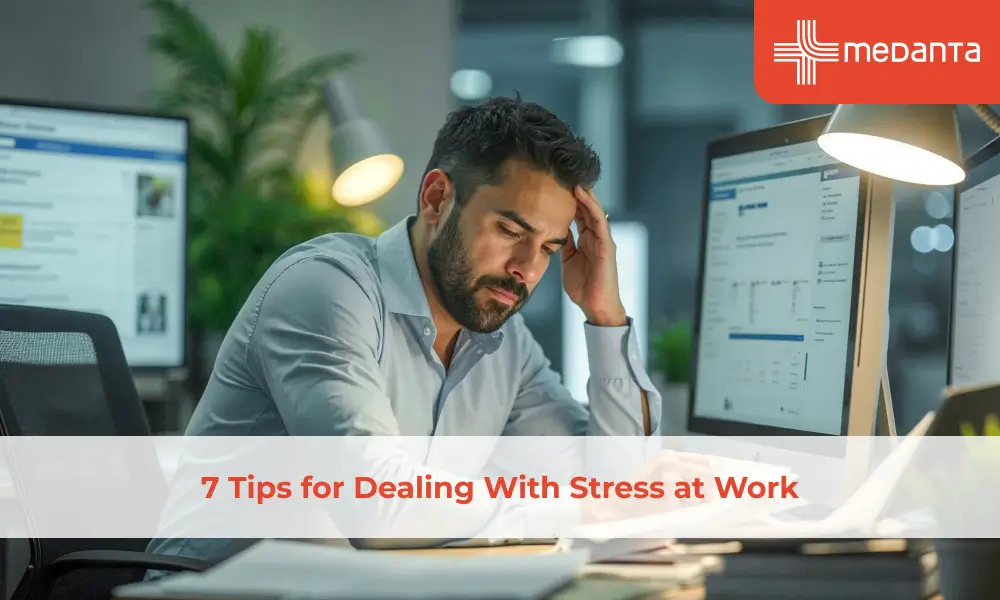7 Tips for Dealing With Stress at Work

Very often, stress can originate from your job. Everyone who has ever held a job will agree that no matter how much they love their job, at some point they’ve felt work-related pressure. You may experience short-term stress, such as trying to meet deadlines on a project or pressure when it comes to fulfilling a challenging task. However, this work stress can easily become chronic and have adverse effects on your physical and mental well being.
Long-term stress is unfortunately very common. But remember that you are not powerless. Effectively coping with job stress can be beneficial to both your professional, as well as personal life. Here are 7 ways you can take charge of stressful situations.
-
Get The Right Start To The Day
A hectic morning schedule that involves dropping the kids off at school, dodging morning traffic, and grabbing a quick breakfast instead of something healthy, leaves many of us stressed even before we get to work. Coming into work already stressed, just makes you more reactive to workplace stress. If you start your day early with good nutrition, proper planning, and a positive attitude, you may see a significant reduction in workplace stress.
-
Be Clear About What You Want

One of the main factors that contribute towards job burnout is undefined work responsibilities. If you don't know what your role is at work or if you find that work requirements keep changing from time to time, you may find yourself more stressed than necessary. If you are always on the brink of confusion, unsure of what you’re doing, it may be a good idea to talk to your supervisor. Understand what they expect from you, put in place a strategy to meet these expectations and resolve any pending issues. This can take stress off both your backs.
-
Don't Get Bogged Down by Conflicts
Interpersonal conflicts at work can take a toll on your physical and emotional health. Conflict with work colleagues is difficult to escape, making it a good idea to avoid it altogether. Do not participate in office gossip, don’t share too many personal opinions about religion and politics, and steer clear of controversial office humour. Avoid or minimise interaction with people at work that don’t work well with others.|
-
Be Organised

Planning ahead and staying organized can greatly diminish stress at work. By organising your time, you won’t be rushing into morning meetings unprepared or end up late all the time. Keeping yourself organised will help you to avoid piling work up and will make you more efficient with your tasks.
-
Get Comfortable
Although you may not notice it right away, physical discomfort can be a stressor. An uncomfortable chair, bad lighting, and office noise are some of the most common triggers at the workplace. If you practically live in your office chair, it can give rise to a sore back, making you more reactive to stress. Be mindful of what is causing you stress at work and ensure that you are working from a quiet and comfortable workplace.
-
Avoid the Temptation to Multitask

Gone are the days when multitasking was heralded as a fantastic quality in an employee. People have now realized that while multitasking helps tackle multiple tasks at once, it hampers efficiency and accuracy. Not focussing on one task, can leave you feeling jittery and distracted. Instead of multitasking, complete one task at a time.
-
Stay Active
Many people get stressed due to lack of physical activity. While you can always schedule a workout or a brisk walk in the mornings and evenings, you may not have the time to do so daily. One way you can manage stress at work is by getting some light exercise during your lunch break. You can also take a few breaks throughout the day to blow off some steam. Not only will this lift your mood, but it will also help you get into better shape.
Managing external stressors, being physically active, eating healthy, and getting enough sleep will help boost your resilience towards stress. Be mindful of how you use your time and energy by focussing on activities that are important to you, instead of concentrating on the negatives of your work and personal life.






